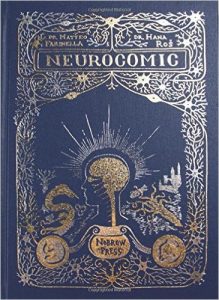This is a short comic, which provides a quick sort of overview of some basic  neuroscience and history of brain studies. It’s an interesting idea, but it didn’t really work for me. The artwork is very rudimentary, and the concepts are fairly straightforward. It didn’t feel to me like the ideas especially benefited from a comic format. The book did have an interesting sort of dreamy feel, in which a man goes through a sort of Alice in Wonderland style world of the mind, but ultimately I didn’t feel the concept paid off so much as provided occasional enigmatic bookends to sections.
neuroscience and history of brain studies. It’s an interesting idea, but it didn’t really work for me. The artwork is very rudimentary, and the concepts are fairly straightforward. It didn’t feel to me like the ideas especially benefited from a comic format. The book did have an interesting sort of dreamy feel, in which a man goes through a sort of Alice in Wonderland style world of the mind, but ultimately I didn’t feel the concept paid off so much as provided occasional enigmatic bookends to sections.
Category: Science
We Have No Idea: A Guide to the Unknown Universe
I’m trying to figure out how I should handle books by people I know, given that it means I’m not a reliable source. I think from now on, I need to just have a blanket caveat. So, here goes:
I know the author (one of them, anyway) so I am not a reliable source.
Bam. OK, so this is a sort of quick primer on all sorts of areas of particle physics and cosmology where we don’t have a good sense of what’s going on, such as with Dark Energy or the nature of time. It is peppered with jokes and comics to lighten things up a bit. So, if you’re a fan of Jorge Cham and want to learn some physics of the universe, I recommend it!
A Numerate Life: A Mathematician Explores the Vagaries of Life, His Own and Probably Yours
What a fun and strange little autobiography. Paulos is a mathematician and writer whose books I’ve enjoyed in the past. They’re word books, and they’re not for everyone. For instance, this book has a (quite clever!) section on transhumanist pickup lines.
You may ask what that’s doing in an autobiography. Well, this isn’t *really* an autobiography. It contains a few stories from Paulos’ life, but the bulk of the book is either digressions into topics that interest Paulos or discussions of why memoirs are probably mostly false, in that they rely on flawed memories and attempt to create cogent narratives of haphazard lives. In some ways it reads like a long chat with a beloved grandfather who’s quite quirky. All in all, the terrible puns notwithstanding, that’s a pretty good thing.
Atomic Accidents: A History of Nuclear Meltdowns and Disasters: From the Ozark Mountains to Fukushima
This book. It’s a treasure, really. Sometimes, pop science books are written by people like me – interested non-experts who can turn a phrase. That’s fine, and I like those books. But, now and then you get a book where someone pours a lifetime of expertise and stories beteween the covers. That’s what Mahaffey has done.
This book is mostly a sequence of discussions of exactly what happened at particular nuclear accidents (ranging from nuclear power to nuclear bombs). The depth of his research is sometimes staggering. He also has funny stories, and he provides insights into the psychology of disasters in general.
That said, it’s thick. It’s thick and although it CAN be consumed by people who aren’t well-versed in nuclear power, it’s gonna send you to wikipedia a lot. And, especially in the middle of explanations about nuclear plants, it can get really tough to follow. Here’s a sample sentence from page 344, which I wrote down to illustrate the point: “In the 177FA design, B&W had replaced the troublesome Crosby PORV with a Dresser 31533VX30.”
One gets the idea that there exists some nuclear engineer who reads “Crosby PORV” and bursts out laughing at the very idea of such a thing. Personally, I found I just had to accept that, as someone without a graduate degree in nuke stuff, there were parts that flew over my head. That said, Mahaffey is such a charming writer, so obviously in love with his subject, it can be enjoyable even when it’s hard to follow.
Ethics in the Real World: 82 Brief Essays on Things That Matter
This is a collection of short essays by the great utilitarian philosopher, Peter Singer. I found it enjoyable and stimulating, but I find I am just not prepared to get onboard this form of hardcore utilitarianism, which says “Action X would increases total human happiness. Thus, not doing it is unethical.” Partially, this is because this sort of statement at least seems non-obvious to me. But, more importantly, I think it’s often hard to know the consequences of actions, especially in the longterm. I’m willing to buy the idea that a dollar I spend on cake would bring more pleasure if given to a starving poor person overseas. But, it’s not clear to me that this sort of thing is true in the big picture. For instance, if it’s true that buying Chinese consumer electronics will ultimately raise the Chinese living standard, is it unethical for me not to buy them? Another for instance – is it obvious that $50,000 buying meals for poor people overseas is more ethical (in a consequentialist sense) than spending that money on a scholarship for someone who will improve renewable energy.
Now, in fairness, these are short essays meant for public consumption. Singer can’t address every possible objection, and for all I know he handles these sorts of complaints elsewhere. On the whole, a worthy read.
Mind Children: The Future of Robot and Human Intelligence
I guess you’d categorize this as an early work (late 80s) in the modern futurology movement. The book is somewhat about the particular idea of creating superior robot descendants of humanity, but a more appropriate title would be something like “A brief history of computing up to 1988, followed by a bunch of stuff Hans Moravec thinks about.” On the whole, it’s pretty good! A lot of the speculations are obviously a bit out of date, and in some ways this is very interesting when we think about modern futurologists.
For example, Moravec thought that by the year 2000 we’d have a general purpose robot assistant. This wasn’t just a blind guess, either. He made estimates comparing neuronal and computer processing power, and thus guessed we’d have a robot assistant computer brain within 10 years of when the book was written. This not only hasn’t happened, but the closest thing we’ve got is the Roomba (or, perhaps the Baxter industrial bot). Makes you wonder about these people predicting full brain emulation by the 2030s or so.
The Victorian Internet: The Remarkable Story of the Telegraph and the Nineteenth Century’s On-line Pioneers
A delightful quick history of the telegraph, which shows that much of the things we think are unique to the Internet were present about 150 years ago, including “online” communities, and predictions that connectivity would free information and bring about peace. Whoops!
The Man Who Knew Infinity: A Life of the Genius Ramanujan
A great biography of Ramanujan, with the one caveat (for the potential buyer) that, well… from the perspective of storytelling, Ramanujan’s life just wasn’t that exciting. Of course, as a mathematician (in ways I’m sure I don’t understand) he was one of the most incredible in history. But, perhaps for that reason, his life consists of a lot of sitting around, having abstruse discussions, and making poor dietary choices. It’s a very good biography, but it can’t help but feel a bit tedious here and there, when describing minor flaps between Ramanujan and his relatives, for instance. This sort of thing is made doubly tiresome by the fact that it seems we often don’t actually know the full nature of this or that disagreement, because Ramanujan is treated almost like a God by those who knew him.
Still, quite good, and if you want to know about Ramanujan, this is probably the book!
Demerit: Kanigel repeats an incorrect etymology of the word “posh” in which it purportedly is a sea acronym for Port Outward Sea Home. This is known to be false.
The Hidden Life of Trees: What They Feel, How They Communicate—Discoveries from a Secret World
I really enjoyed this book. Wohlleben works in forest management, and has written a wonderful book on all the weird ways in which trees adapt to their environments and communicate with each other (using chemical signals, electric signals, etc.). It contains a ton of strange info – for example, apparently some bug-infested trees will chemically signal parasitoids to come eat the bugs that are harming the tree. The author also claims that old trees are more disease resistant because they can communicate with each other about what pathogens have entered the area.
Wohlleben occasionally gets a little sappy and mystical about forestry, but all of his serious claims are either backed by scientific evidence or have a disclaimer that they’re just something he suspects is true.
